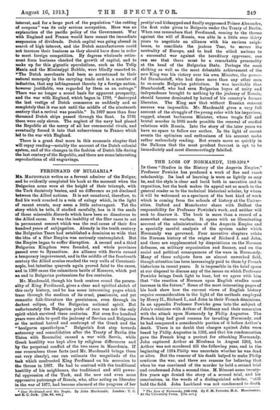FERDINAND OF BULGARIA.* MB. MACDONALD writes as a fervent admirer
of the Bulgar, and be evidently completed his book at the moment when the Bulgarian arms were at the height of their triumph, with the Turk decisively beaten, and no difference as yet disclosed between the Allied nations. It is not unnatural, therefore, to find his work couched in a vein of eulogy which, in the light of recent events, may seem a little extravagant. Yet the story which he tells, if studied carefully, has in it the seeds of those miserable discords which have been so disastrous to the Allied cause. It was the inability of the Slav races to act in permanent concert which was the real cause of their five hundred years of subjugation. Already in the tenth century the Bulgarian Tsars had established a dominion so wide that the idea of a Slav Empire was seriously contemplated. But the Empire began to suffer disruption. A second and a third Bulgarian Kingdom were founded, and whole provinces passed over to Byzantium. An alliance with Servia caused a temporary improvement, and in the middle of the fourteenth century the Allied armies reached the very walls of Constanti- nople, but intestine quarrels again proved fatal to the cause, and in 1389 came the calamitous battle of Kossovo, which put an end to Bulgarian pretensions for five centuries.
Mr. Macdonald, though his book centres round the person- ality of King Ferdinand, gives a clear and spirited sketch of this early history, and he has some interesting pages which trace through the medium of its cruel, passionate, and yet romantic folk-literature the persistence, even through its darkest eclipse, of the Bulgarian national spirit. But unfortunately the Bulgarian pride of race was not the only spirit which survived these centuries. Not even five hundred years were able to quell the jealousy of Servian and Bulgarian or the mutual hatred and contempt of the Greek and the " bonlgaros apanthropos." Bulgaria's first step towards autonomy and consolidation after the Treaty of Berlin (the Union with Roumelia) caused a war with Servia, while Greek hostility was kept alive by religious differences and by the perpetual conflict of the two races in Macedonia. If one remembers these facts (and Mr. Macdonald brings them out very clearly), one can estimate the magnitude of the task which confronted King Ferdinand on his accession to the throne in 1887. He had to contend with the traditional hostility of his neighbours, the traditional and still power- ful oppression of the Turk, and the new and even more oppressive patronage of Russia, who, after acting as liberator in the war of 1877, had become alarmed at the progress of her
. Czar Ferdinand and His People. By John Macdonald. London : T. C. and E. C. Jack. [12s. ed. net.] protige and kidnapped and finally suppressed Prince Alexander, the first ruler given to Bulgaria under the Treaty of Berlin. When one remembers that Ferdinand, coming to the throne against the will of Russia, was able in a little over thirty years to negotiate an alliance with his envious neigh- bours, to conciliate the jealous Tsar, to secure the neutrality of Europe, and to lead the allied nations to a successful war against the hereditary oppressor, one can see that there must be a remarkable personality at the head of the Bulgarian State. Perhaps the most striking as well as the most debatable achievement of the new King was his victory over his own Minister, the power- ful Stambouloff, who had done more than any other man to re-create Bulgarian patriotism. It was inevitable that Stambouloff, who had seen Bulgarian hopes of unity and independence brought to nothing by the jealousy of Russia, should become dominated by hatred of his country's former liberator. The King saw that without Russian consent success was impossible. Mr. Macdonald gives a very full account of the struggle of the young ruler with his imperious, rugged, almost barbarous Minister, whose tragic fall and brutal murder in 1895 made possible the renewal of cordial relations with Russia. Into the story of the later years we have no space to follow our author. In the light of recent events the optimism and enthusiasm of his account make rather melancholy reading. But events move so quickly in the Balkans that the most prudent forecast is apt to be immediately and most disconcertingly falsified.


































 Previous page
Previous page